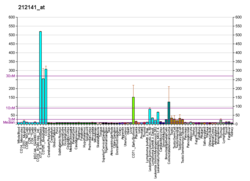| MCM4 | |||||||||||||||||||||||||||||||||||||||||||||||||||
|---|---|---|---|---|---|---|---|---|---|---|---|---|---|---|---|---|---|---|---|---|---|---|---|---|---|---|---|---|---|---|---|---|---|---|---|---|---|---|---|---|---|---|---|---|---|---|---|---|---|---|---|
| Identifiers | |||||||||||||||||||||||||||||||||||||||||||||||||||
| Aliases | MCM4 , CDC21, CDC54, NKCD, NKGCD, P1-CDC21, hCdc21, minichromosome maintenance complex component 4, IMD54 | ||||||||||||||||||||||||||||||||||||||||||||||||||
| External IDs | OMIM: 602638; MGI: 103199; HomoloGene: 40496; GeneCards: MCM4; OMA:MCM4 - orthologs | ||||||||||||||||||||||||||||||||||||||||||||||||||
| |||||||||||||||||||||||||||||||||||||||||||||||||||
| |||||||||||||||||||||||||||||||||||||||||||||||||||
| |||||||||||||||||||||||||||||||||||||||||||||||||||
| Wikidata | |||||||||||||||||||||||||||||||||||||||||||||||||||
| |||||||||||||||||||||||||||||||||||||||||||||||||||
DNA replication licensing factor MCM4 is a protein that in humans is encoded by the MCM4 gene. [4]




